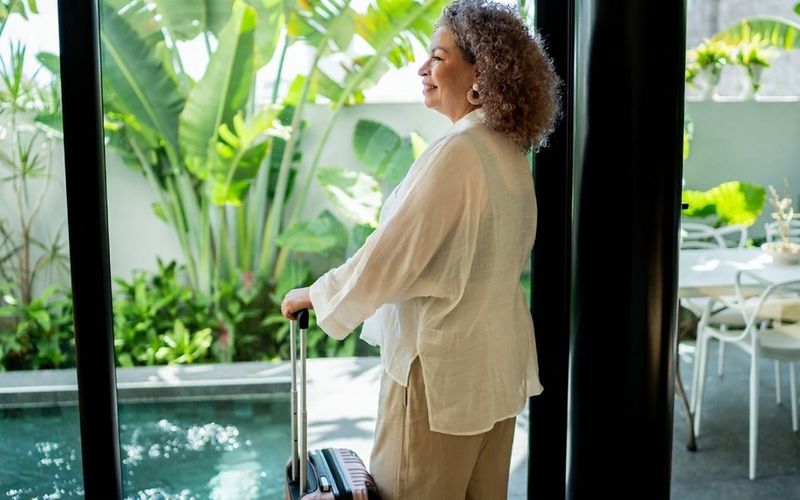Are you someone who gets excited just thinking about airport snacks and hotel mini shampoos? Or maybe you’re flirting with the idea of packing a bag and finally using that passport that’s been sitting in a drawer since 2009? (You’ll probably want to think about renewing that passport before heading out, though.)
I am a firm believer that travel opens your eyes, refreshes your spirit, and adds new chapters to your story. But even the most exciting adventures can be dampened by theft, scams, or safety concerns. Staying safe while traveling isn’t about being fearful; it’s about staying informed and being prepared.
Heading out on a weekend getaway or finally taking that long-awaited international bucket list trip? These smart travel habits can help you feel more confident, stay alert, and avoid common pitfalls.
Read more: 2025 Guide to Travel Trends and Tips for Women Over 50.
How Can I Keep My Money and Documents Safe While Traveling?
Carrying all your cash, cards, and ID in one wallet is risky. A better approach is to separate your valuables: keep one credit card and a small amount of cash in your bag or pocket for daily use, and store your backup cards, cash, and passport in a secure location.
Tips:
- Use hotel safes or hidden pouches for backups.
- Photocopy your passport, ID, and credit cards in case they’re lost. I also send myself an email with photos of my documents and bank cards.
- Consider carrying a decoy wallet with a small amount of cash.
Recommended product:
Peak Gear Travel Money Belt – Slim and discreet, this belt includes RFID-blocking materials and a recovery tag in case it’s lost.
Should I Use a Crossbody Bag Instead of a Shoulder Bag?
Yes. A crossbody bag keeps your belongings close and secure. Look for features like lockable zippers, slash-proof straps, and compartments you can reach without fully opening the bag.
Tips:
- Wear the bag in front, especially in crowds.
- Avoid bags with flaps that are easy to reach into.
- Don’t carry important items in outside compartments.
Recommended product:
Travelon The Voyages Anti-Theft East/West Crossbody – Stylish and lightweight with all the safety features you need.
How Do I Avoid ATM and Credit Card Scams?
ATM skimmers and card fraud are common scams. Stick to machines inside banks, cover your hand when typing your PIN, and be cautious of people standing too close.
Additional precautions:
- Let your bank know where you’re traveling.
- Enable location-based security on your credit card app.
- Carry more than one card and store them in separate locations.
- Don’t accept help from strangers when retrieving cash at an ATM, and never let anyone handle your card.
What’s the Best Way to Keep My Phone Safe?
Your phone is not only expensive, it also holds travel details, contact info, banking apps, and more. Losing it can be a major disruption. Avoid displaying your phone in high-theft areas.
Tips:
- Use biometric locks (fingerprint or facial recognition).
- Download a “find my phone” app and test it before leaving home.
- Avoid setting phones down on café tables or ledges.
Recommended product:
Gear Beast Universal Phone Lanyard – Comfortable to wear, helps prevent accidental drops or theft.
Can I Spot Common Tourist Scams Ahead of Time?
Yes. Most scams rely on catching you off guard. If you know what to look out for, you’ll spot the warning signs early. Some common travel scams include:
- “Friendship bracelets” being tied to your wrist, followed by a demand for money.
- Someone pointing out “bird poop” on your clothes and trying to clean it (while stealing your belongings).
- People pretending to help you with tickets or directions, only to demand a tip or pick your pocket.
How to avoid:
- Politely decline any unsolicited help.
- Research common scams in your destination city before your trip.
- If it feels too helpful or too pushy, walk away.
Is It Safer to Blend in with the Locals?
Looking less like a tourist can reduce your chances of being targeted. You don’t have to change your entire wardrobe, but it helps to dress modestly and avoid obvious signs of wealth.
Tips:
- Choose neutral or muted colors instead of bold tourist tees.
- Avoid large backpacks or dangling cameras when walking around.
- Observe local customs for dress, especially in temples, mosques, or churches.
How Do I Protect Myself from Pickpockets in Crowded Areas?
Pickpockets often work in pairs or groups and rely on distraction. Crowded areas like subways, festivals, and open-air markets are their favorite spots.
Tactics that help:
- Keep your hand on your bag when walking through a crowd.
- Use carabiners or clips to secure zippers.
- Don’t hang jackets or backpacks on chairs in restaurants.
Recommended product:
Nite Ize LSB3-01-R6 S-Biner SlideLock Dual Locking Carabiner – a durable dual-locking carabiner that securely clips and locks gear in place with two independently locking stainless steel gates.
Should I Register with My Embassy Before Traveling?
If you’re traveling internationally, especially to remote or politically unstable areas, registering with your country’s embassy or consulate can be a wise move. It allows officials to contact you in case of emergencies like natural disasters, civil unrest, or family concerns back home.
Tips:
- Use the STEP (Smart Traveler Enrollment Program) if you’re a U.S. citizen.
- Share your itinerary and emergency contacts with a trusted friend or family member.
- Keep a digital and printed copy of your passport, visas, and emergency numbers handy.
Why it matters:
- Being registered makes it easier for your government to assist you if things go sideways, and it gives loved ones peace of mind knowing there’s a plan in place.
What’s the Smartest Way to Use Transportation Safely?
From taxis to tuk-tuks, transportation can be a vulnerable moment in travel. Plan ahead to avoid getting stuck or overcharged.
Safety advice:
- Arrange airport transfers through your hotel.
- Use rideshare apps with GPS tracking.
- Always know the expected fare in advance or confirm pricing before starting your trip.
If you’re using public transport:
- Stand near other riders, not in isolated areas.
- Avoid falling asleep on long train or bus rides.
- Keep your bags on your lap or between your feet.
How Can I Keep My Phone and Computer Safe When Using Public Wi-Fi?
Free Wi-Fi is tempting, especially at airports and cafés, but it comes with risks. Hackers can easily intercept unprotected data.
Protection tips:
- Use your phone’s data instead of public Wi-Fi when possible.
- Avoid logging into bank accounts or accessing sensitive data on shared networks.
- Use a VPN to encrypt your information.
Recommended product:
NordVPN – Works across all devices, is easy to use, and is excellent for safe browsing while traveling.
Is It Wise to Share My Travel Plans on Social Media?
While posting real-time updates and photos is tempting, it can tip off potential thieves that your home is empty or make you more traceable while traveling.
Safer sharing tips:
- Post photos after the trip.
- Use privacy settings to limit who can view your updates.
- Try not to share specific locations while you’re still there, especially if you have a very visible and public social media presence.
Should I Trust My Intuition While Traveling?
Your instincts are often your best guide. If something feels off, don’t ignore it. Whether it’s an overly aggressive vendor, a strange alley, or a person who seems too interested in your plans, leave.
Simple rule:
- If your gut says no, it’s a no.
I have learned throughout my travels that listening to my internal warning can be one of my most powerful safety tools.
Read more: The Ultimate Guide to Solo Travel for Women over 50.
What Else Can Help Me Travel More Safely?
Learn Key Phrases
Even if you don’t speak the language, knowing a few key words and phrases in the local language can be helpful. Think about downloading a language app on your phone to help you translate phrases and even have conversations.
Read more: 6 Best Language Translation Apps – Speak and Understand Any Language.
Keep Emergency Contacts Handy
Store local emergency numbers, the address of your hotel, and your country’s embassy or consulate info in your phone and on a paper copy in your bag.
Travel Insurance is Worth It
It can cover theft, canceled flights, and medical emergencies. Look for one that includes 24-hour assistance.
How Can I Travel Confidently and Stay Safe?
The goal of this article is certainly not to instill fear and paranoia of unknown places that you want to travel to. Smart travel habits don’t mean you have to be anxious and paranoid. Think of them as tools to help you feel in control and enjoy your travels. When you know your valuables are safe, your phone is secure, and you’re aware of what to watch out for, you can relax and be present in the moment.
The goal isn’t to avoid all risk – that’s impossible. The goal is to be prepared and alert without letting fear hold you back. Travel is meant to be joyful.
Read more: The 10 Safest Countries to Travel as a Woman Over 50
Let’s Have a Conversation:
What are your must-do habits for staying safe while traveling? Have you ever encountered a scam or learned a lesson the hard way? What travel gear or apps give you peace of mind? Share your tips, stories, and questions in the comments. Let’s help each other travel smarter and safer.










